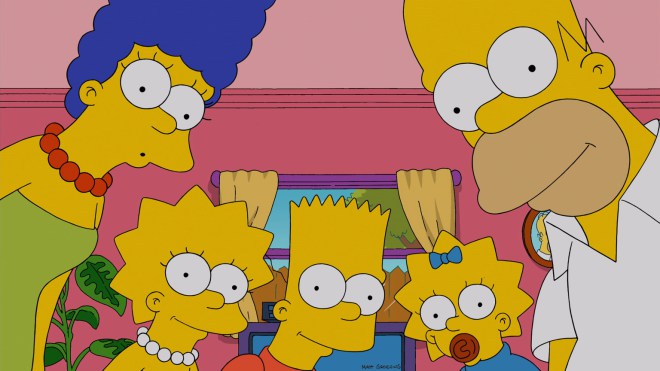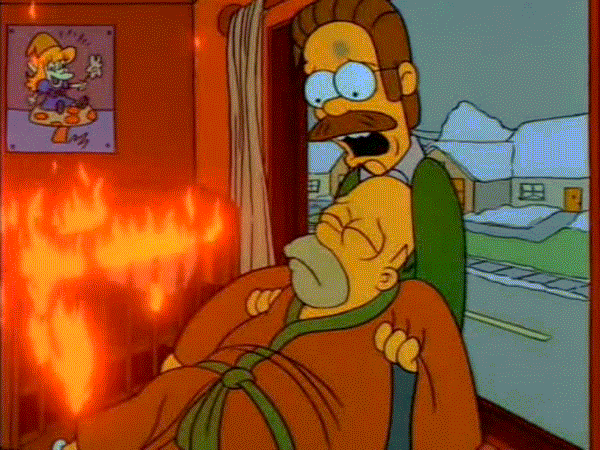Won’t somebody think of The Simpsons?
"The Simpsons is not just a cartoon. It’s one of the important shows in television history."

“They’ll never stop The Simpsons” they once sang of everyone’s favourite yellow family.
Bringing to end the seventeenth episode of the long running animated series’ thirteenth season over ten years ago, the cruel but catchy Billy Joel parody brilliantly pokes fun at The Simpsons’ longevity. It begins by recounting past plots, quickly moving on to suggesting possible future storylines, each one becoming increasingly far-fetched (what if Marge WAS a robot though, HUH?).
“Have no fear” it continues “we have stories for years.” 287 episodes later and that lovable lampoon is starting to sound less like a catchy, funny little ditty used to apologise for yet another clip show and more and more like an unsettling, sinister threat.
Earlier this month, Fox announced that the show had been renewed for another two seasons, taking its run to a groin-grabbingly remarkable 625 episodes. As the unwavering popularity of the show, amongst audiences and network producers alike, shows no sign of declining, the quality of its output, however, does.
Now, in a hugely disappointing turn of events, last month it was announced that long time and original cast member Harry Shearer was to depart the show. Taking to Twitter, the man behind the iconic voices of Ned Flanders, Seymour Skinner and Mr Burns appeared to confirm his departure due to a breakdown in contract negotiations.
In response, show runner Al Jean used the social media site in attempt to ease unsurprisingly concerned fans, hinting that, rather than kill of Shearer’s characters, they’ll simply recast them. Jean also declared that:
.@thesimpsons #everysimpsonsever The show will go on, made by people who love it and see in it the most wonderful vehicle for satire ever.
— Al Jean (@AlJean) May 14, 2015
Well, maybe it shouldn’t. As the show trundles towards its 30th anniversary, perhaps it’s time for Jean, Matt Groening and co to finally admit what even the most ardent of Simpsons fans have known for some time; it’s time somebody stopped The Simpsons. The show’s decline is no secret. For over a decade now, episodes have barely been cromulent and have done very little to embiggen the show’s reputation and legacy. In fact it’s been a long time since The Simpsons has been the wonderful vehicle for satire Jean describes.
In its early incarnation, The Simpsons was an exciting mix of bold, cutting satire and silly slapstick humour – making it seem both incredibly dangerous and entirely trivial – a wonderfully refreshing combination. The Simpsons managed to use its meticulous and manic spin on pop-culture to create and cement its own place as an iconic piece of mainstream media.
At its best, the show held up a mirror to society, telling meaningful stories that had significant relevance, not just in popular culture, but to family life, to politics and amongst communities. Barbra Bush missed the point when she described The Simpsons as “the dumbest thing [she] had ever seen.” It was actually consistently the smartest thing on the box. George H. W. Bush missed it again when he promised:
“We’re going to keep trying to strengthen the American family. To make them more like the Waltons and less like the Simpsons.”
See, George JR was wrong. Not just about the American family either. The reason The Simpsons became so universally popular is that it embodied everything that makes people great and, in turn, that made it great too.
Far from being a family to deride and dismiss, Homer, Marge, Lisa, Bart and little Maggie offered something genuinely relatable and, for many, a realistic, obtainable life to aspire to. Here, for the first time, our TV screens showed a family just like the vast majority of ordinary folk – working hard and struggling, but managing to get by, besieged by life’s little problems. Long before it became the unstoppable merch-machine it is today, The Simpsons had a heart, something which it seems to have sadly forgotten.
Backed by an unrelenting wave of pop culture references and some cutting satire The Simpsons told stories that, apart from being incredibly hilarious, were really important. In the season two episode Two Cars In Every Garage And Three Eyes On Every Fish we see the writers tackle political spin, as C Montgomery Burns runs for office. A high point sees Burns attempt to defend his mutant, three-eyed fish as an example of natural selection, backed by none other than Charles Darwin himself. “Only a moron wouldn’t cast his vote for Monty Burns” indeed.

In season four, Homer takes on religion in Homer The Heretic. After skipping church one Sunday to enjoy a lazy morning, Homer decides never to return again. Events transpire – an astray cigar very nearly burns the Simpsons household down – only for Homer and the home to be saved by neighbours of varying religious denominations, leaving a profound message on togetherness through faith.
The Simpsons had bigger targets than Jesus, too. In season five’s Homer’s Barbershop Quartet, John Lennon and the other fab three are made fun of as we mark the rise and fall of Homer’s barbershop quartet. Countless cultural references culminate in a glorious ending, as well as some perfectly performed parodies.
While James Bond was mocked brilliantly in the episode You Only Move Twice, featuring a criminally underused in episodes since Hank Scorpio.
It was never afraid to go dark either. Issues such as infidelity, marriage and alcohol abuse and even suicide were tackled delicately with heart and humour.
Season five sees Homer swayed away from his flu-ridden wife by an attractive new work colleague in The Last Temptation Of Homer. A beautifully written episode sees the viewer stay on Homer’s side despite Mindy’s lure. Of course his unwavering love for Marge wins the day. It wasn’t, however, the only time their marriage was tested.
 In season eight’s El Viaje Misterioso De Nuestro Jomer (The Mysterious Voyage Of Homer, Marge finally has enough of her husband’s alcohol abuse. In a hallucination caused by one too many Guatemalan insanity peppers, Homer meets his spirit guide – a coyote voiced by Johnny Cash – who urges him to find his true soulmate. Thankfully, Homer’s painstaking soul searching results in a glorious lighthouse reunion scene, as he realises that Marge was his soulmate all along.
In season eight’s El Viaje Misterioso De Nuestro Jomer (The Mysterious Voyage Of Homer, Marge finally has enough of her husband’s alcohol abuse. In a hallucination caused by one too many Guatemalan insanity peppers, Homer meets his spirit guide – a coyote voiced by Johnny Cash – who urges him to find his true soulmate. Thankfully, Homer’s painstaking soul searching results in a glorious lighthouse reunion scene, as he realises that Marge was his soulmate all along.
Meanwhile, in a stand out moment in season three, Homer contemplates suicide after losing his job. Homer’s Odyssey sees Bart, Lisa and Maggie’s father write a moving suicide note to his family before heading off to a bridge to end his life by attaching a boulder to himself and jumping off.
 Fate is on hand to save the day, as Lisa discovers the note, the family rush to save him but are almost run over by a speeding truck. Homer pulls them to safety just in time, leading him to his vocation of public safety crusader. A tearful Homer is then forced to choose between his principles and a return to his old job. Vowing to improve the safety of the Nuclear Power Plant, he addresses a baying crowd by declaring they must fight their battles alone from this point. At the end of the episode, Homer is lofted high by the residents of Springfield in a genuinely heart-warming and poignant ending.
Fate is on hand to save the day, as Lisa discovers the note, the family rush to save him but are almost run over by a speeding truck. Homer pulls them to safety just in time, leading him to his vocation of public safety crusader. A tearful Homer is then forced to choose between his principles and a return to his old job. Vowing to improve the safety of the Nuclear Power Plant, he addresses a baying crowd by declaring they must fight their battles alone from this point. At the end of the episode, Homer is lofted high by the residents of Springfield in a genuinely heart-warming and poignant ending.
These are all stunning, effecting and ground-breaking examples of moments that helped create a legacy most shows strive for in a ten season span, let alone in those first five or so classic Simpson series.
Today, twenty five years after it first hit our screens, the once great cartoon is now a shadow of its former self. Storylines have become just as far-fetched as the parody song hinted towards, while the writing feels like tired rehashes of their best work. The characters, too, are starting to feel their age. Bart has gone from the troubled but lovable scamp, to an annoying brat, Lisa has grown more and more obnoxious. These days Marge is no more than a sighing, groaning irrelevant wreck. It’s a world away from the passionate, good intentioned mother who leapt to the defence of her family after criticism from Barbara Bush.
Homer, meanwhile, has changed beyond all recognition. Long gone is the naïve but endearing father. The dim but dedicated dad struggling along, doing his best for his family is no more, replaced now by the moronic, inarticulate fool with none of the warmth or affection that made him such a strongly identifiable character in the first place.
Rumours suggest forthcoming episodes will see a much loved character die, as Sideshow Bob finally gets his boy and TV’s favourite and most endearing couple finally call it quits and file for divorce. While these stories may have The Simpsons keeping up with the times, it only serves to feel like a gimmick to entice viewers, instead of an honest and sincere portrayal of modern family life.
Yes, it’s time somebody stopped The Simpsons.
If things continue the way it has over the past ten years, there’s a very real danger that they’ll be more terrible, poorly written and just plain unfunny episodes of The Simpsons than classics – which is a horrifying thought.
The Simpsons is not just a cartoon. It’s one of the important shows in television history. Don’t risk ruining its legacy by continuingly contributing to its alarming decline, even after original cast members have been and gone. Hiring replacements and imitations for the likes of Harry Shearer will result in just that – cheap imitations and that shouldn’t be what this once great series is about.
Please, won’t somebody think of The Simpsons.



































